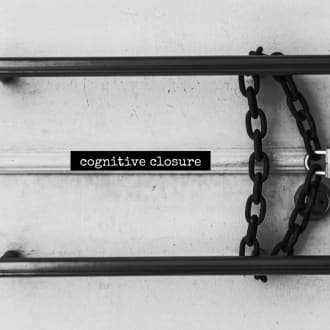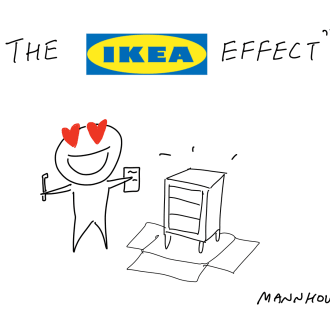
10 Best Articles on Cognitive Psychology
The most useful articles on cognitive psychology from around the web, curated by thought leaders and our community.
Refind focuses on timeless pieces and updates the list whenever new, must-read articles or videos are discovered.
Top 5 Cognitive Psychology Articles
At a glance: these are the articles that have been most read, shared, and saved on cognitive psychology by Refind users in 2024 so far.
- 50 Cognitive Biases in the Modern World
- Three Cognitive Biases We All Have (and How to Fight Them)
- Reopening the mind: how cognitive closure kills creative thinking
- Cognitive biases and brain biology help explain why facts don’t change minds
- The IKEA Effect - Why people fall in love with their own ideas
Videos
Watch a video to get a quick overview.
Anjan Chatterjee: How your brain decides what is beautiful
TED Talk Subtitles and Transcript: Anjan Chatterjee uses tools from evolutionary psychology and cognitive neuroscience to study one of nature's most captivating concepts: beauty. Learn more about the…
Short Articles
Short on time? Check out these useful short articles on cognitive psychology—all under 10 minutes.
Reopening the mind: how cognitive closure kills creative thinking
The need for cognitive closure is the motivation to find an answer to ambiguous situations — any answer that aligns with our existing knowledge. Not only can it lead us to make mistakes based on…
«we should seek knowledge to resolve questions regardless of whether that new knowledge points to an answer that aligns with what we believe or what we want»
Three Cognitive Biases We All Have (and How to Fight Them)
Everyone has these common cognitive biases—even you.
«tendency to overestimate our abilities»
Cognitive biases and brain biology help explain why facts don’t change minds
Here are some reasons for the natural human tendency to avoid or reject new information that runs counter to what you already know – and some tips on how to do better.
«confirmation bias. It’s the natural tendency to seek out information or interpret things in a way that supports your existing beliefs.»
The IKEA Effect - Why people fall in love with their own ideas
Howie Mann on Sep 3, 2022 6 minute readThe IKEA effect describes how people come to overvalue things in which they have successfully put effort into. This cognitive bias can pose risks to…
«Spike rough prototypes and MVPs to test ideas early. Embrace sharing ideas that you are embarrassed with so it will be easier to cull.»
Sans Forgetica
Sans Forgetica is a typeface designed using the principles of cognitive psychology to help you to better remember your study notes.
Long Articles
These are some of the most-read long-form articles on cognitive psychology.
We don’t have a hundred biases, we have the wrong model
Behavioral economics has identified dozens of cognitive biases that stop us from acting 'rationally'. But instead of building up a messier and messier picture of human behavior, we need a new model.
Yale Psychology Professor on the 6 Ways You're Thinking Wrong--and What You Can Do About Them
Our species adopted a host of cognitive strategies to survive and thrive. These lessons can help you avoid their pitfalls.
«But rather than blaming the athletes themselves, the jinx may be explained by a purely statistical phenomenon known as regression toward the mean.»
50 Cognitive Biases in the Modern World
Our rapidly evolving world forces us to adopt distinct patterns of behavior, and in the process, paves the way for new cognitive biases to emerge.
«THE GOOGLE EFFECT Also known as “digital amnesia”, the aptly named Google Effect describes our tendency to forget information that can be easily accessed online.»
This is why cognitive behavioural therapy works so well
“So, tell me about your mother…” is probably what people think about when they think of therapy. But psychoanalysis, with its emphasis on early childhood, is only one branch of therapy, and if probing deep into your personal history doesn’t sound like your cup of tea, you may want to give cognitive behavioral therapy a try. getAbstract recommends University of Arizona psychology professor David Sbarra’s brief synopsis of cognitive behavioral therapy to readers who know that stifling their emotions isn’t good, but don’t want to wallow in them either.
What is Refind?
Every day Refind picks the most relevant links from around the web for you. Picking only a handful of links means focusing on what’s relevant and useful.
How does Refind curate?
It’s a mix of human and algorithmic curation, following a number of steps:
- We monitor 10k+ sources and 1k+ thought leaders on hundreds of topics—publications, blogs, news sites, newsletters, Substack, Medium, Twitter, etc.
- In addition, our users save links from around the web using our Save buttons and our extensions.
- Our algorithm processes 100k+ new links every day and uses external signals to find the most relevant ones, focusing on timeless pieces.
- Our community of active users gets the most relevant links every day, tailored to their interests. They provide feedback via implicit and explicit signals: open, read, listen, share, mark as read, read later, «More/less like this», etc.
- Our algorithm uses these internal signals to refine the selection.
- In addition, we have expert curators who manually curate niche topics.
The result: lists of the best and most useful articles on hundreds of topics.
How does Refind detect «timeless» pieces?
We focus on pieces with long shelf-lives—not news. We determine «timelessness» via a number of metrics, for example, the consumption pattern of links over time.
How many sources does Refind monitor?
We monitor 10k+ content sources on hundreds of topics—publications, blogs, news sites, newsletters, Substack, Medium, Twitter, etc.
Can I submit a link?
Indirectly, by using Refind and saving links from outside (e.g., via our extensions).
How can I report a problem?
When you’re logged-in, you can flag any link via the «More» (...) menu. You can also report problems via email to hello@refind.com
Who uses Refind?
450k+ smart people start their day with Refind. To learn something new. To get inspired. To move forward. Our apps have a 4.9/5 rating.
Is Refind free?
Yes, it’s free!
How can I sign up?
Head over to our homepage and sign up by email or with your Twitter or Google account.
Keep Learning
Get the big picture on your favorite topics.









